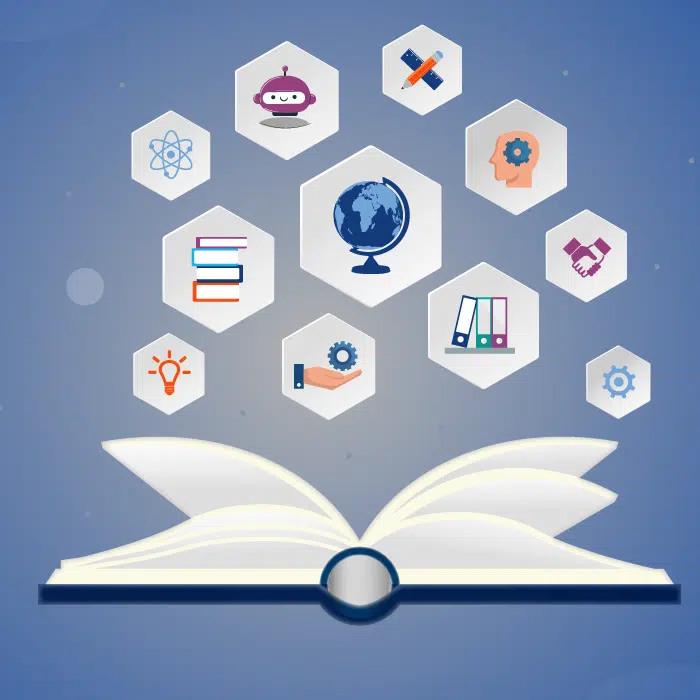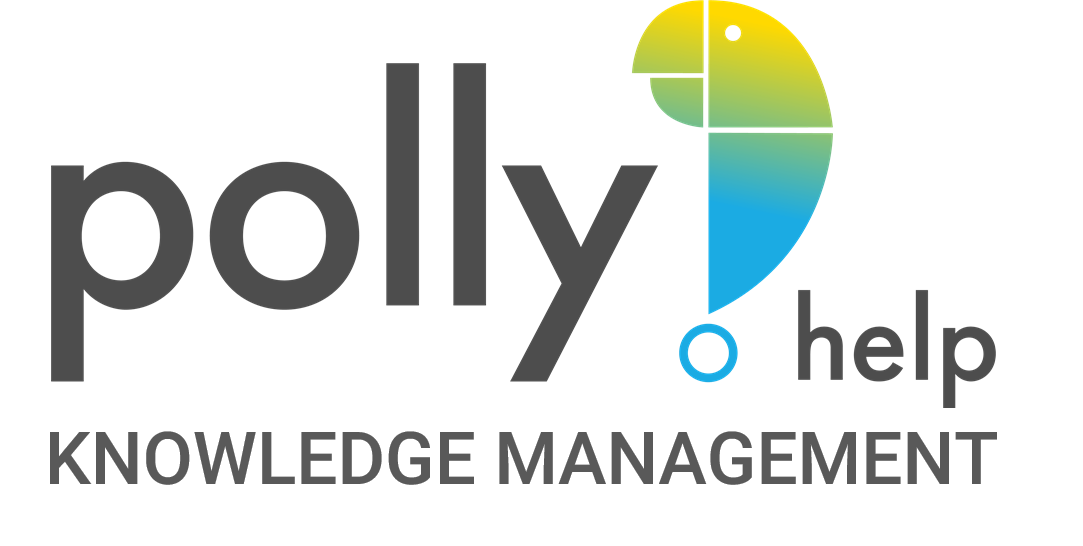In an era dominated by data, AI for knowledge management stands as a game-changer for businesses aiming at the pinnacle of efficiency and innovation. Enterprises drowning in data have discovered a formidable companion in artificial intelligence. It skillfully unwraps complex data layers, converting them into actionable insights. Through AI, knowledge management strategies are evolving, ensuring knowledge pursuit leads to impactful benefits, boosting a company’s operational effectiveness.
AI showcases a broad spectrum of applications, from analyzing unstructured data to bolstering data-driven decision-making. The power of AI in digesting data and delivering precise knowledge when needed pushes enterprise efficiency standards higher. This shift towards AI-focused knowledge practices paves the way for intelligent platforms. These platforms become essential drivers of organizational progress and learning, rather than just tools.
Key Takeaways
- AI brings a competitive edge to knowledge management by processing vast data into insightful information.
- Enhanced enterprise efficiency with the integration of AI in managing and utilizing corporate knowledge.
- Actionable insights derived from AI improve data-driven strategies and decision-making.
- Artificial intelligence aids in creating organizational knowledge assets that drive growth.
- Advancements in AI technologies underscore the crucial role of intelligent systems in business innovation.
Understanding AI’s Role in Modern Knowledge Management
Artificial Intelligence (AI) has radically changed how we manage knowledge in the workplace. Its role in uncovering new information, pulling insights from data, and enhancing cognitive processes surpasses old-fashioned ways of handling data. AI dismantles complex data barriers and makes sharing knowledge within companies smoother and more efficient.
The Emergence of AI in Knowledge Repositories
With companies collecting enormous amounts of information, AI’s role in knowledge bases is becoming crucial. It uses cognitive computing to sift through data effectively, pinpointing key information that aids in making well-informed decisions. This integration of AI provides swift access to organized knowledge, creating personalized info experiences for users in different sectors.
AI Technologies Driving Knowledge Management: Machine Learning and NLP
Machine Learning (ML) and Natural Language Processing (NLP) stand out in the AI sphere, transforming knowledge management. ML algorithms are adept at sorting content within databases, improving how easily users can find what they need. At the same time, NLP revolutionizes query interpretation, allowing systems to grasp context and meaning far beyond simple keywords. The collaboration of ML and NLP doesn’t just make extracting knowledge more accurate; it significantly improves how we discover valuable insights across digital platforms.
Enhancing Search Capabilities with AI for Knowledge Management
In today’s digital world, adept management of knowledge is crucial for businesses to efficiently navigate and use large data volumes. AI-powered search algorithms have become essential, offering an intelligent search approach. This method is adept at delving deeply into data to unearth valuable insights.
These search platforms harness the power of natural language processing (NLP). They grasp user requests in a nuanced manner, akin to human understanding, and deliver accurate results. It transcends simple keyword searches by comprehending the underlying intent and context, thus providing relevant answers, not mere links.
Data mining similarly gains from AI, with algorithms fine-tuning their ability to identify patterns and trends that might slip by unnoticed. They effortlessly sift through both structured and unstructured data, including internal communications, emails, and extensive databases. This results in a precision that greatly enhances knowledge discovery within enterprises.
- Rich Data Interpretation: AI algorithms process the meaning behind queries for more meaningful results.
- Contextual Awareness: With NLP, search results adapt to the context of the user’s needs.
- Continuous Learning: Machine learning elements of AI evolve search capabilities over time.
- Uncovering Hidden Connections: Advanced algorithms reveal associations between disparate data sets for comprehensive insights.
Implementing these AI-powered search algorithms eradicates the need to manually filter through irrelevant data, speeding up the delivery of crucial information. It alters an enterprise’s data landscape into an easily navigable and accessible field for all organization members.
Intelligent search isn’t just convenient—it’s a vital strategic tool in the modern era. It empowers businesses to distinguish themselves through the depth and nimbleness of their knowledge management practices.
As corporate data volumes grow, combining AI with natural language processing and sophisticated search algorithms leads to groundbreaking knowledge management solutions. With AI guiding the way, reaching an informed data-driven organization isn’t just achievable; it’s becoming the norm.
The Intersection of AI and Collaboration in the Workplace
In today’s interconnected corporate world, AI plays a critical role in enhancing collaboration in the workplace. Cognitive computing technologies are creating spaces where knowledge is easily shared. This results in decisions that are more informed and intuitive.
Facilitating Expertise Discovery and Sharing with Cognitive Computing
Cognitive computing is crucial for AI-driven collaboration. It processes data similarly to the human mind, making it possible to pinpoint organization experts and solve complex issues. This synergy between human and machine fosters an environment enriched with shared knowledge and collective wisdom.
Personalized Knowledge Delivery and Recommendation Engines
The move towards personalized knowledge delivery is revolutionizing workplace learning. Recommendation engines powered by AI specialize content for individual employees, enhancing their role and performance. This approach offers a bespoke learning journey for everyone.
These engines analyze employee interactions and skills to recommend necessary information. This promotes an adaptive learning culture, tailored to each person’s unique needs and experiences. Such personalization boosts each employee’s workplace value and supports their professional development.
| Feature | Benefits |
|---|---|
| Expertise Location | Reduces time to find subject-matter experts within an organization |
| Contextual Insights | Delivers information relevant to specific projects or challenges |
| Learning Recommendations | Proposes resources for skill development based on past engagements |
| Knowledge Sharing | Encourages the distribution of insights and experiences team-wide |
With ongoing advancements, these systems create a workplace where collaboration is not just encouraged, but becomes inherent. Cognitive computing paves the way for innovation, fuels creativity, and initiates a new phase in personalized knowledge delivery and workplace efficacy.
AI-Driven Data Analytics and Decision-Making
In today’s business landscape, the combination of artificial intelligence with data analytics marks a significant shift. It paves the way for faster, more informed decision-making processes. This integration is key for crafting strong business strategies. It helps organizations stay agile and adapt quickly to market changes.
From Data to Insights: AI’s Impact on Business Strategies
AI-driven analytics play a crucial role in strategy development. They turn vast amounts of data into actionable insights swiftly and precisely. By utilizing sophisticated algorithms, businesses can delve into their data. They can devise strategies that are both reactive and proactive, gaining a competitive edge.
Predictive Analytics and Forecasting: Anticipating Market Trends
At the forefront of AI’s power are predictive analytics. They enable businesses to predict market changes before they happen. AI examines past patterns and variables that influence the market. This allows companies to see future scenarios. Such insights are crucial for strategic planning, helping businesses stay ahead of market trends and use their resources wisely.
- Enhanced Accuracy: AI algorithms reduce the margin for error in data interpretation.
- Real-time Analysis: With AI, the continuous assessment of data feeds into an agile business response.
- Competitive Intelligence: AI tools identify and evaluate the strategies of competitors.
The adoption of AI-driven analytics changes the game in decision-making and strategy effectiveness. In our era, rich with data, AI’s ability to predict has a profound effect on business operations. It pushes the boundaries of growth and innovation.
Evolving Enterprise Knowledge with Machine Learning
The landscape of enterprise knowledge is becoming increasingly complex, thanks to machine learning. No longer do we rely on fixed data stores. We are entering an era of evolving, self-improving systems that revolutionize organizational intelligence. Powered by artificial intelligence, these systems utilize vast data reserves. This empowers them to improve autonomously.
Bringing machine learning into the enterprise world resembles initiating a digital woodland. Each algorithm represents a tree; each data point, a leaf. Collectively, they create a perennial source of wisdom. This technology fosters predictive models. They foresee market changes with outstanding precision. This guides strategic planning and improves decision-making.
- Autonomous learning: Uses self-evolving algorithms, reducing human involvement in analyzing data.
- Enhanced decision-making: Applies predictive models to interpret past and current data for forecasting trends. This equips leaders with actionable insights.
- Data-centric strategies: Focuses on merging data analytics with corporate planning. This promotes informed, data-led business actions.
The collaboration of machine learning with artificial intelligence is unlocking new paths to access enterprise knowledge. It’s revolutionizing decision-making processes. We’re moving from instinctual to data-driven judgments, grounded in solid evidence. As predictive models grow more refined, the scope of what enterprises can accomplish expands significantly.
Streamlining Knowledge Curation and Organization through AI
Data is the lifeblood of the modern enterprise and must be organized meticulously. This is vital for catalyzing informed decision-making. Artificial Intelligence (AI) presents a pivotal solution for knowledge curation through automated classification systems. These enhance data retrieval and significantly reduce the time spent on organizing volumes of data.
Automating the Classification and Tagging of Enterprise Data
With tagging enterprise data, AI boosts productivity by instantly categorizing information. It uses content, context, and value for categorization. This automation leads to a dramatic reduction in manual work, ensuring an efficient, consistent knowledge base.
Let’s delve deeper into the impact of AI’s automated classification:
- Consistent application of metadata.
- Effortless retrieval of related documents.
- Faster processing and analysis of incoming data.
Knowledge Graphs and Their Role in Organizing Information
Knowledge graphs embody a transformative approach in data organization. These complex structures offer a multidimensional view, connecting varied datasets for deeper insights.
The integration of knowledge graphs brings various benefits:
- Enhanced data interconnectivity.
- Improved precision in search and discovery.
- Personalized information landscapes.
See the table below for an overview of knowledge curation without and with AI integration.
| Criteria | Without AI | With AI |
|---|---|---|
| Accuracy of Data Tagging | Subject to human error | Highly accurate |
| Efficiency in Organization | Time-consuming | Swift and automated |
| Scalability of Data Management | Limited | Extensive |
| Cost of Curation | Resource-intensive | Cost-effective |
| Personalization Capabilities | Generic data relationships | Dynamic and user-centric |
In summary, AI is revolutionizing the approach to enterprise data curation. Through automated classification to the expansive networks in knowledge graphs, AI paves the way for a smarter, more agile future in knowledge management.
Real-World Applications of AI in Enterprise Knowledge Management
The inclusion of AI in enterprise knowledge management has revolutionized content creation and data processing. Significant advancements can be seen through real-world applications. These AI tools show a bright future for efficiency and connectivity in the business world.
Innovations in Content Creation and Summarization with AI
Companies are now using AI to streamline the creation of informative content. Thanks to generative AI, summarizing large data sets and crafting clear, concise documents is easier than ever. This advancement allows for the generation of important content on a large scale, meeting a wide array of needs.
AI-Powered Tools and Platforms: Case Studies and Success Stories
Case studies highlight how AI improves search and authoring in companies. AI tools have become vital for team collaboration on knowledge. They ensure that information flows smoothly, helping employees stay informed and make quick, informed choices.
- AI platforms providing intuitive search experiences that reduce time spent locating information
- Generative AI tools assisting in the quick summarization of lengthy reports, aiding in rapid decision-making
- AI-powered content creation tools that tailor information to user intent, improving relevance and applicability
These real-world examples show the effectiveness of AI in transforming how companies manage and share knowledge. They reflect the positive changes many organizations have experienced.
Overcoming Implementation Challenges for AI in Knowledge Management
Implementing AI in knowledge management systems poses several challenges that organizations must overcome. The successful integration of AI requires addressing issues like data privacy, AI system security, bias mitigation, and employee adoption. These are crucial for leveraging AI effectively and responsibly in the enterprise environment.
Addressing Data Privacy, Security and Bias in AI Systems
Addressing data privacy is critical when integrating AI into knowledge management. Organizations must comply with regulations and standards to safeguard sensitive information while leveraging AI capabilities. Concerns about AI systems security also demand attention. It’s essential to protect against breaches and unauthorized access to ensure data and AI operations’ integrity. A combination of encryption, audits, and access controls is often essential.
Another important focus is bias mitigation in AI. It’s vital to design and train AI systems to minimize bias and maintain decision-making integrity. Employing diverse data sets for AI training and assessing AI recommendations regularly prevents patterns of bias. This helps keep AI algorithms as objective as possible.
Strategies for Enhancing Employee Adoption and Skill Development
Maximizing AI’s potential requires employee adoption of new technologies. Training is essential for staff to effectively use AI tools. Initiatives like tailored workshops, e-learning modules, and support channels are fundamental for skill development. Promoting a digital literacy culture enables employees to adapt to AI-enabled knowledge management systems seamlessly.
Commitment to these strategies helps organizations overcome implementation challenges posed by AI. Emphasizing data privacy, enhancing security, striving for unbiased AI, and promoting employee engagement ensures a resilient, future-ready knowledge management infrastructure. This positions enterprises as leaders in the knowledge-driven economic landscape.
Conclusion
The relentless march of innovation has paved the way for a bold new era in the realm of knowledge management. The future of knowledge management is one where the fusion of human intellect with AI integration transforms enterprises into bastions of efficiency and cutting-edge innovation. Artificial intelligence, with its unparalleled data management capabilities, is rapidly becoming an indispensable ally to organizations seeking to maintain a competitive edge in an ever-shifting marketplace.
Looking ahead, the symbiotic relationship between AI and human expertise promises to revolutionize corporate strategies. This signals a wave of enterprise innovation. The journey toward harnessing the full potential of AI in knowledge management faces hurdles. However, the rewards beckon those who navigate these challenges with foresight and adaptability.
Successfully integrating AI means not only staying ahead of technological trends. It also requires ensuring that the infusion of AI into corporate ecosystems is seamless and strategically aligned with organizational goals. This strategic alignment is vital for achieving long-term success.
For businesses on the cusp of transformation, now is the time to leverage the formidable capabilities of AI. Organizations that deftly integrate cognitive technologies into their practices will enhance decision-making. They also fortify their position in the global market. The nexus of AI and knowledge management is a revolution, setting the stage for a significant leap in enterprise evolution.





